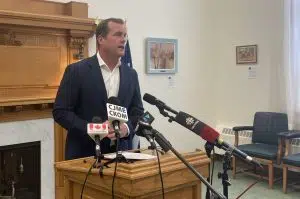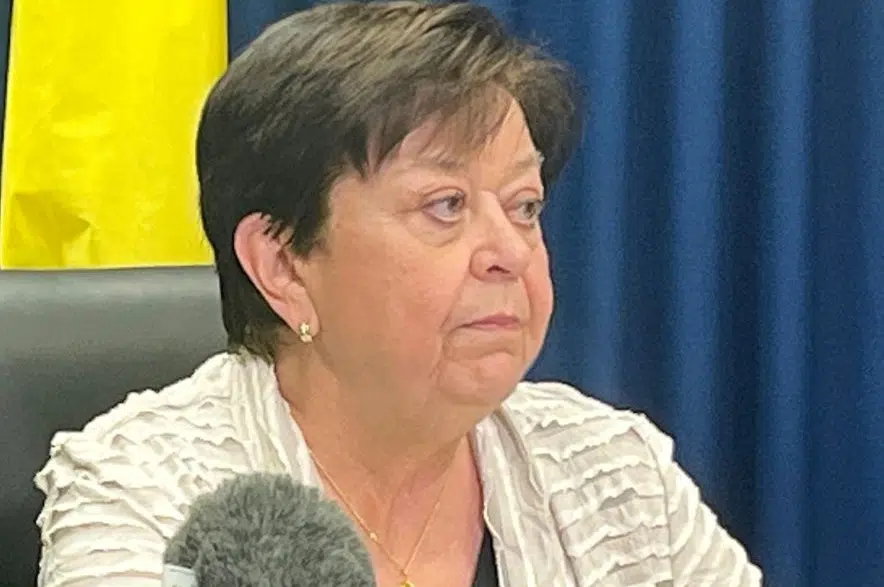The Saskatchewan government is forecasting a surplus of $485.5 million in its first-quarter financial report, down more than half a billion dollars from budget.
During a news conference in Saskatoon on Thursday, Finance Minister Donna Harpauer said the decrease of $532 million from budget was because of lower oil and potash prices, higher non-cash pension expenses, and spending to fight wildfires and safely evacuate those impacted by the fires.
“Resource revenue is volatile, and forecasts can change quickly due to impacts on global prices and on production,” Harpauer said.
Even so, Harpauer maintained the province is still on target to retire up to $1 billion in operating debt.
“We’re able to do so due to a strong year-end in 2022-23 with higher opening cash balances that have offset the drop in the projected surplus. While the $1.5 billion in the operating debt was retired last fiscal year, annualized interest savings is projected to be $110 million,” she added.
Even with the lower surplus estimate, Harpauer said the Saskatchewan economy continues to perform well.
“Private sector forecasters expect Saskatchewan to have the second-highest economic growth this year among provinces with real GDP growth of 1.8 per cent in 2023, followed by the third-highest growth among province in 2024 with real GDP growth of 1.2 per cent,” she said.
The government said the revenue at first quarter is forecast to be $19.6 billion, down $123.7 million from expectations in the budget. The decrease is largely due to a reduction of $528.9 million in the non-renewable resources revenue forecast.
According to the report, potash revenue fell by $317.2 million, mainly due to lower prices (a decrease of US$30.6 from budget), lower-than-budgeted sales volumes and higher operating costs. As well, oil and natural gas revenue is projected to fall by $42.9 million.
However, that decrease in resource revenue was offset by a combined increase of $405.2 million across all other revenue categories, including taxation revenue. The government said that was caused by “ongoing strength in consumption and, as a result, Provincial Sales Tax revenue.”
The expenses at the first-quarter mark were forecast to be $19.1 billion, up $408.2 million from budget.
The government said there was an increase of $317.2 million in education, general government and finance charges, due largely to a non-cash increase in pension expense. The government also paid $89 million more than expected to fight wildfires and to safely evacuate those impacted by the fires.
The government said its net-debt-to-GDP is projected to be 13.4 per cent at the end of 2023-24, which currently is ranked second among the provinces.
No affordibility cheques in 2023
Even though the province is still predicting a surplus of nearly half a billion dollars, Harpauer cautioned people not to expect any more of the $500 “affordability cheques” sent out in late 2022.
“The affordability cheque that we did late last year cost us $450 million. So that would deplete our entire surplus,” she said.
According to the finance minister, Saskatchewan is not in the fiscal position this year to give out the cheques because of future expenses not yet calculated, including negotiating a new teachers’ contract, crop insurance costs, the impact of the Port of Vancouver strike, and increasing health-care expenditures.
“We have to take those all into consideration. Will we borrow money to do an affordability cheque? I would say no,” Harpauer added.
‘Inexcusable:’ NDP reacts to financial report
The NDP is growing more frustrated that the Saskatchewan Party is still not making any moves to help people with the cost of living.
“This is a government sitting on revenue strength. At the same time, people are facing the hardship of a generational cost-of-living challenge, and a government that has made things worse,” Trent Wotherspoon, the NDP’s finance critic, said during a media conference at the Legislative Building.
“It’s simply wrong and inexcusable for this government to sit on windfall revenues while people are paying the price, and for that government to impose an additional cost for people that are struggling in such a way.”

NDP Finance Critic Trent Wotherspoon says the Saskatchewan Party needs to be doing more to help people with cost of living challenges after the first-quarter financial report was released Aug. 31, 2023. (Gillian Massie/980 CJME)
Wotherspoon said taxes being piled on top of the backs of Saskatchewan people have them competing with costs. SaskPower rate hikes, grocery bills and PST rates are causing people to struggle.
“We see (the government) doubling down in not offering a stitch of relief but instead trying to defend the new costs, and taxes, and hikes they have proposed on Saskatchewan people,” said Wotherspoon. “That’s wrong, and it’s inexcusable as I’ve said for a government to not provide relief to families in this situation.”
With an additional $149.7 million in PST revenues, Wotherspoon said the Sask. Party needs to peel back PST to help people with a cost-of-living crisis.
“At the end of the day, this won’t help our economy and it doesn’t help our fiscal sustainability and strength to ignore the reality that families are facing and tip them into a more precarious financial situation,” said Wotherspoon.
Wotherspoon hopes the provincial government uses those windfall revenues to give support to people like other provinces are doing.
“Other provinces are certainly providing much less fiscal capacity than we have to families during this historical cost-of-living challenge, but in the case of our government, they are not providing that relief and in fact they are making things worse,” he said.
“It’s inexcusable.”
— With files from 980 CJME’s Gillian Massie











